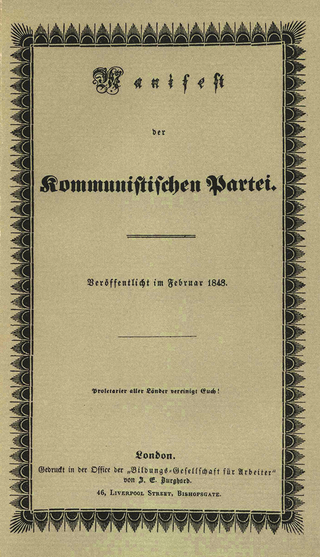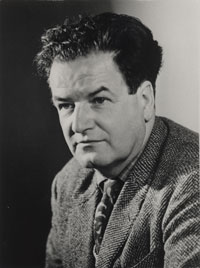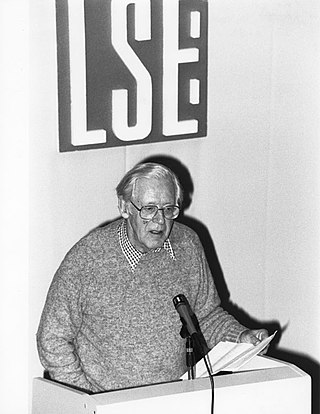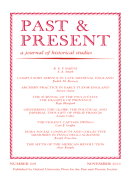Historiography is the study of the methods used by historians in developing history as an academic discipline, and by extension, the term historiography is any body of historical work on a particular subject. The historiography of a specific topic covers how historians have studied that topic by using particular sources, techniques of research, and theoretical approaches to the interpretation of documentary sources. Scholars discuss historiography by topic — the historiography of the United Kingdom, of WWII, of the pre-Columbian Americas, of early Islam, and of China — and different approaches to the work and the genres of history, such as political history and social history. Beginning in the nineteenth century, the development of academic history produced a great corpus of historiographic literature. The extent to which historians are influenced by their own groups and loyalties — such as to their nation state — remains a debated question.

The Communist Manifesto, originally the Manifesto of the Communist Party, is a political pamphlet written by Karl Marx and Friedrich Engels, commissioned by the Communist League and originally published in London in 1848. The text is the first and most systematic attempt by Marx and Engels to codify for wide consumption the historical materialist idea that "the history of all hitherto existing society is the history of class struggles", in which social classes are defined by the relationship of people to the means of production. Published amid the Revolutions of 1848 in Europe, the Manifesto remains one of the world's most influential political documents.

John Edward Christopher Hill was an English Marxist historian and academic, specialising in 17th-century English history. From 1965 to 1978 he was Master of Balliol College, Oxford.
Social history, often called "history from below", is a field of history that looks at the lived experience of the past. Historians who write social history are called social historians. Social history came to prominence in the 1960s, with some arguing that its origins lie over a century earlier.

The New Left Review is a British bimonthly journal covering world politics, economy, and culture, which was established in 1960.
Labor history is a sub-discipline of social history which specializes on the history of the working classes and the labor movement. Labor historians may concern themselves with issues of gender, race, ethnicity, and other factors besides class but chiefly focus on urban or industrial societies which distinguishes it from rural history.

Rodney Howard Hilton was an English Marxist historian of the late medieval period and the transition from feudalism to capitalism.
Arthur Leslie Morton was an English Marxist historian. He worked as an independent scholar; from 1946 onwards he was the Chair of the Historians Group of the Communist Party of Great Britain (CPGB). He is best known for A People's History of England, but he also did valuable work on William Blake and the Ranters, and for the study The English Utopia.
Jonathan Charles Douglas Clark is a British historian of both British and American history. He received his undergraduate degree at Downing College, Cambridge. Having previously held posts at Peterhouse, Cambridge and All Souls College, Oxford into 1996, he has since held the Joyce C. and Elizabeth Ann Hall Distinguished Professorship of British History at the University of Kansas.
Brian Manning was a British Marxist historian.
Edward Victor Gordon Kiernan was a British historian and a member of the Communist Party Historians Group. Kiernan's work was prominent in the field of Marxist historiography in Britain, analyzing historical events from a Marxist point of view. Belonging to a group of prominent British Marxist historians active in the 20th century, Kiernan was a member of the Communist Party of Great Britain from 1934 until 1959, when he left in protest over the party's response to the Hungarian Revolution of 1956. He was also involved in promoting Urdu poetry among Western audiences.
Dona Ruth Anne Torr was a British Marxist historian, and a major influence on the famous Communist Party Historians Group. Aside from her translations of many Marxist classics into English, she is perhaps best known for her unfinished biography of the important labour activist, Tom Mann, Tom Mann and his Times.

Citizens: A Chronicle of the French Revolution is a book by the historian Simon Schama, published in 1989, the bicentenary of the French Revolution.
"The terror," declared Schama in the book, "was merely 1789 with a higher body count; violence ... was not just an unfortunate side effect ... it was the Revolution's source of collective energy. It was what made the Revolution revolutionary." In short, “From the very beginning [...] violence was the motor of revolution.” Schama considers that the French Revolutionary Wars were the logical corollary of the universalistic language of the Declaration of the Rights of Man and of the Citizen, and of the universalistic principles of the Revolution which led to inevitable conflict with old-regime Europe.
Robert Paul Brenner is an American economic historian. He is a professor emeritus of history and director of the Center for Social Theory and Comparative History at UCLA, editor of the socialist journal Against the Current, and editorial committee member of New Left Review. His research interests are early modern European history, economic, social and religious history, agrarian history, social theory/Marxism, and Tudor–Stuart England.

Edward Arthur Thompson was an Irish-born British Marxist historian of classics and medieval studies. He was professor and director of the classics department at the University of Nottingham from 1948 to 1979, and a fellow of the British Academy. Thompson was a pioneer in the study of late antiquity, and was for decades the most prominent British scholar in this field. He was particularly interested in the relations between Ancient Rome and "barbarian" peoples such as the Huns and Visigoths, and has been credited with revitalizing English-language scholarship on the history of early Germanic peoples. Thompson's works on these subjects have been highly influential.

Eric John Ernest Hobsbawm was a British historian of the rise of industrial capitalism, socialism and nationalism. His best-known works include his tetralogy about what he called the "long 19th century" and the "short 20th century", and an edited volume that introduced the influential idea of "invented traditions". A life-long Marxist, his socio-political convictions influenced the character of his work.

Edward Palmer Thompson was an English historian, writer, socialist and peace campaigner. He is best known for his historical work on the radical movements in the late 18th and early 19th centuries, in particular The Making of the English Working Class (1963).
The Communist Party Historians' Group (CPHG) was a subdivision of the Communist Party of Great Britain (CPGB) that formed a highly influential cluster of British Marxist historians. The Historians' Group developed social history, which was popularised in the 1960s with "history from below" approach described by E. P. Thompson. During the heyday of the Historians' Group, from 1946 until 1956, notable members included Thompson, Christopher Hill, Eric Hobsbawm, Raphael Samuel, as well as non-academics like A. L. Morton and Brian Pearce. The Historians' Group arose at the University of Cambridge in the 1930s under the encouragement of the economist Maurice Dobb.
Marxist historiography, or historical materialist historiography, is an influential school of historiography. The chief tenets of Marxist historiography include the centrality of social class, social relations of production in class-divided societies that struggle against each other, and economic constraints in determining historical outcomes. Marxist historians follow the tenets of the development of class-divided societies, especially modern capitalist ones.
The historiography of the United Kingdom includes the historical and archival research and writing on the history of the United Kingdom, Great Britain, England, Scotland, Ireland, and Wales. For studies of the overseas empire see historiography of the British Empire.








